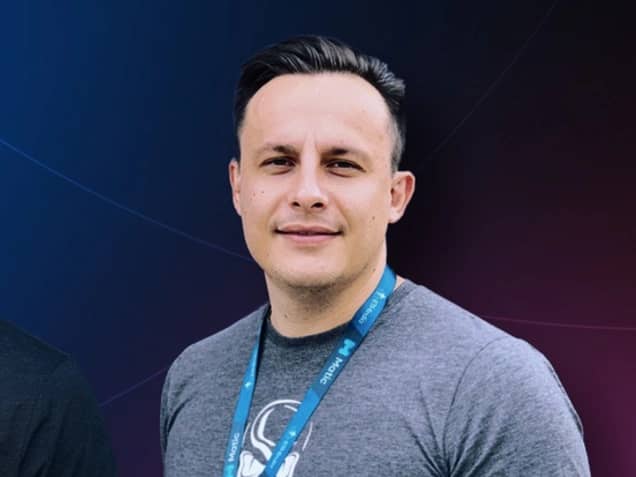订阅 wiki
Share wiki
Bookmark
Sergej Kunz
0%
Sergej Kunz
Sergej Kunz 是一位软件开发人员,也是 1inch 的联合创始人,1inch 是一种 DEX 聚合器,旨在优化跨各种 DEXes 的交易。
职业生涯
Kunz 在很小的时候收到他的第一台电脑时,就对电脑产生了浓厚的兴趣。他学会了拆卸和重新组装它,这促使他追求计算机系统方面的教育。由于互联网访问受限,他深入研究编程,利用图书馆资源自学成才。[1]
到 17 岁时,Kunz 已经掌握了足够的编程技能来获得自由网络开发项目。中学毕业后,他从事编程事业,同时继续在该领域接受教育。他还开发了一个短信聚合系统,为他的第一个企业奠定了基础,该企业于 2014 年与他的全职工作同时启动。[1]
通过在 Commerce Connector 和 Herzog 等公司担任职务,他培养了在各种领域的编码能力,包括 PHP 和前端开发。从 2015 年到 2019 年,他为博世、西门子和保时捷等主要客户承担了咨询项目,最终在保时捷获得了一份全职职位,最初在 DevOps 部门,后来转向网络安全部门。[1]
尽管在 2012 年通过 挖矿 初步接触了 加密货币,但他通过过渡到 以太坊 挖矿 更深入地研究了 加密货币,直到 2018 年初,他被 区块链 技术的潜力所吸引。他通过他的 YouTube 频道 CryptoManiacs 分享了他的专业知识,对智能合约进行实时安全审计。在一次会议中,他与 Anton Bukov 建立了联系,Anton Bukov 是他在 1inch 的未来联合创始人,他们在该频道上合作了六个月。他们的合作关系通过参与各种黑客马拉松而发展,包括在新加坡的一次,他们在那里获得了奖项。这一成功在随后的黑客马拉松中得以延续,并获得了 以太坊 全球的两项主要奖项。[1]
1inch
2019 年 5 月,Kunz 和 Bukov 在纽约市的一次黑客马拉松中创建了一个 去中心化交易所 (DEX) 聚合器,历时 60 小时的编码马拉松。最初,他们的概念旨在为用户提供来自各种来源的 加密货币 价格信息,以确保获得最佳费率。然而,受到 Kunz 之前开发的 套利 机器人的启发,他们转向了 DEX 聚合器的想法,该聚合器将交易拆分到多个交易所,从而为用户提供更高的费率。虽然他们的解决方案在黑客马拉松中只获得了小奖,但它为 1inch 网络 奠定了基础。[1]
Kunz 和 Bukov 于 2020 年 9 月共同创立了 1inch。在 Bankless 的“通往无需许可之路”系列访谈中,Kunz 讨论了 1inch、它的起源以及他们为 Permissionless 2022 准备的内容。他首先介绍了 1inch 是什么:[2]
“1inch 是 DeFi 的一站式入口,我们称之为 'uh',因为我们几乎将所有流动性来源都集成到了 1inch 中。所以想象一下,如果你要买一张机票,你不会去模拟汉莎航空或阿拉斯加航空,你会聚合起来以获得最优惠的价格。有时,如果你有纽约、法兰克福、迪拜等航班之间的连接,你还需要在正确的时间获得最好的机票。这就是我们为 DeFi 所做的事情。如果你要将一个代币交换为另一个代币,我们会生成路径,就像 Google 地图上的路线一样,但更复杂,以完全非托管的方式,以真正的 P2P 方式将一种资产交换为另一种资产,因此你可以直接与智能合约交互,而无需信任我们,只需使用我们经过多次审计、经过社区验证以及许多安全专家验证的协议。”
“1inch 网络本身始于我们在纽约 ATH 的一个黑客马拉松中花了两个晚上构建的消失聚合。那是 2019 年 5 月。我们两个晚上都没睡,真的很辛苦。最后,我身后的房间开始以某种方式改变,但我能够与我的联合创始人 Anton Bukov 一起完成原型。我向一些人展示了这个产品,他们说,'这是下一个大事件,'这确实是 DeFi 的下一个大事件。例如,交换器官和访问权限毫无意义;使用聚合器以获得最佳结果才有意义。如今,1inch 网络不仅仅是一个聚合协议;它是一种完全无需许可的订单簿限价订单协议,并且这种流动性协议已经有多个团队加入了我们的网络。”
当被问及为什么 1inch 如此受欢迎时,Kunz 回答说:[2]
“所以,我们实际上是在 DeFi 中发明了聚合,在单个交易中完全原子地聚合了多个流动性来源。这就是为什么我们现在拥有最大的市场份额。还有一些其他人刚刚开始效仿我们,比如 Xerox。他们实际上构建了自动簿限价订单协议,并且在看到 DeFi 中存在一个巨大的问题后,他们想到了 1inch:使用算法将所有流动性来源组合成一个。Xerox 开始这样做,ParetoSwap 也加入了竞争。我们是黑客,是黑客马拉松和比赛中的建设者,我们热爱竞争。我们竞争得很好。如果你看看 MetaMask,它正在使用我们、Xerox ParetoSwap 和其他一些流动性来源,并且我们在那里拥有最大的市场份额,因为我们竞争得更好,因为我们集成了更多的流动性来源。”
他还讨论了他们降低 gas 费用和可访问性的 Layer 2 策略:[2]
“我们有 1inch 基金会和开曼群岛,这是一个完全独立于我们的组织。他们仍然持有部分 1inch 代币,并且有一个 gas 费退款计划。如果你质押特定数量的代币,从大约 1,000 个代币开始,你每个月可以获得 25% 的 gas 成本折扣,作为提款的一种形式。如果你质押了大约 100,000 个 1inch 代币,你每个月都会以 1inch 代币的形式获得全额退款。这是一种缓解高 gas 成本问题的小方法,尽管目前这不是什么大问题,因为市场已经大幅下跌,gas 成本也很低。”
“但是,Layer 2 是未来的一个好解决方案。Layer 2 是 DeFi 的一个合适的解决方案。分片架构,以太坊 2.0,它是为其他应用程序设计的,而不是为 DeFi 设计的,因为它会扰乱金融。在中心化金融中,原子执行是必要的,而在我们的案例中,我们执行咨询交易,涉及多个交换、交易所和市场。Layer 2 解决方案提供低 gas 费用、高安全性,我们已经集成了 Optimism。”
访谈/小组讨论
1inch Fusion
在 2023 年 11 月的世界区块链峰会上,Kunz 作为主题演讲者,讨论了 1inch 网络 的增长和发展,追溯了它从成立到目前作为多方面 去中心化金融 (DeFi) 平台的历程。他介绍了 1inch Fusion,这是一种用于代币交换的新颖解决方案,旨在通过利用荷兰式拍卖机制来增强安全性、透明度和用户体验。Kunz 深入研究了 DeFi 领域普遍存在的挑战,例如不可靠的交换费率和三明治攻击,并详细阐述了 1inch 如何通过流动性聚合和严格的 KYB 和 AML 筛选流程来解决这些问题。他还阐明了专业做市商在确保公平费率和降低操纵可能性方面的重要性,并将这种结构与去中心化的纳斯达克进行了比较。此外,Kunz 还强调了开发者门户,该门户提供对 API 的开放访问,从而促进了 DeFi 社区内的协作和创新。[3]
迪拜的 1inch
在与 Pimlico Partners 的 Phillip Lord 的一次访谈中,Kunz 回顾了 1inch 网络 从 2019 年作为黑客马拉松项目成立到在 DeFi 领域建立的历程,拥有超过 1000 万个钱包和数十亿的交易量。他讨论了主要产品,该产品专注于通过交换来确保最佳费率,以及开发自托管钱包和一种优先考虑简单性和安全性的新型硬件钱包。凭借遍布德国、迪拜、阿姆斯特丹、塞浦路斯和巴厘岛的 150 名全球团队,1inch 网络 将其业务范围扩展到不同的市场。Kunz 强调了迪拜的进步监管环境,这有助于他们通过计划获得中东市场的许可来扩大业务范围。回顾过去,1inch 网络 致力于提高开发者的可访问性,推出新的硬件解决方案,探索 原子交换,并研究 Web3 应用程序的去中心化解决方案。[4]
DeFi 的未来
在 2024 年巴黎区块链周 期间,Kunz 讨论了 DeFi 中的“意图”概念。他解释说,意图是旨在实现预期目标的计划行动,重点关注用户想要实现的目标,而不是他们如何实现目标。与常规交易不同,基于意图的交易简化了交互并降低了用户风险,允许用户定义他们的目标,而无需担心执行过程。这种方法提供了诸如优化决策、自动化流程和改进风险管理等好处。Kunz 强调了 DeFi 中意图的示例,包括限价订单、交换、流动性提供和跨链交换,各种协议和项目都在 去中心化金融 领域探索和实施这种方法。[5]
发现错误了吗?
